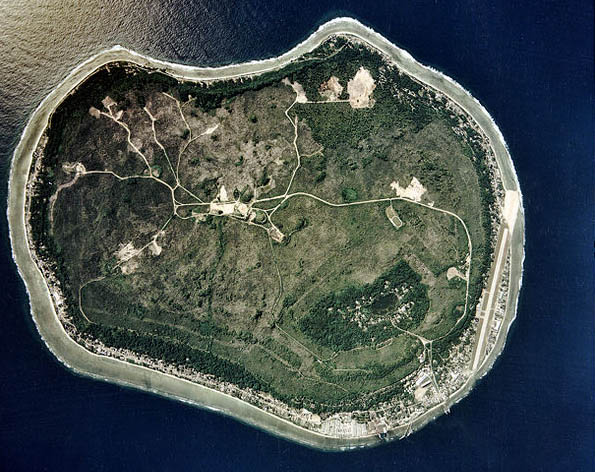Forgotten Kingdom: The Bird-Shit Island January 20, 2013
Author: Beach Combing | in : Contemporary, Modern , trackbackNauru is a small island (about eight square miles) half way between Hawaii and New Zealand made largely of bird droppings. If that does not sound particularly promising consider two further points. First, that its European discoverer named it Pleasant Island in 1798: it was once extraordinarily beautiful. And second that the bird droppings can be mined as phosphates, which are worth a lot of money. The following morality tale has, in fact, a lot to do with money…
Money… Everyone wanted a piece of Nauru. It is enough to list the island’s owners over the last two hundred years. For most of the nineteenth century the Nauruans ruled themselves and spent a lot of that time fighting each other with firearms brought by European traders. In 1888 Germany intervened to end the war and in an amnesty – and encouraged by the threat that tribal leaders would be executed – over seven hundred guns and rifles were handed over to the new authorities; enough to attempt an invasion of Belgium.
The island remained in the German Empire until 1914 when it was occupied by Australians on behalf of the Allies. In 1919 the British created the British Phosphate Commission that ran the island in the interests of Australia, New Zealand and the wider Empire, though not necesarily the Nauruans. In 1923 Australia took over the running of Nauru. In 1942 Japan occupied and Nauru had its worst years: a leprosy outbreak was dealt with by sailing a boat of the afflicted out into the ocean and sinking it. In 1945 a joint New Zealand, Australian and British trusteeship was set up, then in 1968 the island was finally given independence.
Nauruans, Germans, Australians, BPC, Japanese, Commonwealth Trusteeship and Nauruans again. Nauru became a kind of Pacific Krakow passing constantly between powers. It would be interesting to see if any other spot in the Pacific rivals Nauruans in terms of the multiplicity of owners. Beach is tempted to quote Kissinger: ‘if they had grown carrots there no one would have given a damn.’
From 1968 the Nauruans should have had a happy or at least wealthy existence. After all, they now had the phosophate for themselves. And for a while the government was immensely rich, particularly given how small the population was. It also proved though immensely stupid and the money was wasted. Nauru is a nice example of the Dutch disease. Never give your kids an oil well.
By 2006 the phosphates had run out, as had the money, and the island experienced an environmental catastrophe, much of it having been strip mined to water or rock: note the central moonscape in the image above. The lawyers managed to claw some money back through suing Britain, Australia and New Zealand for overexploitation. But the compensation didn’t last either. And then desperation and creativity set in. In 2003, the island briefly tried to get on the US’s patronage list by helping North Korean defectors escape!
90% of the Nauruans are now unemployed and most of those that have jobs owe them to the authorities: hardly Adam Smith’s invisible hand. Still at least Nauru has survived its colonial masters and the passing of the guano. Here’s to a brighter future for one of the world’s most obscure territories. Let’s hope the birds will return.
Beach is always on the look out for ‘forgotten kingdoms’ even when they are republics: drbeachcombing AT yahoo DOT com



